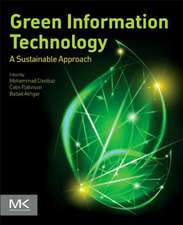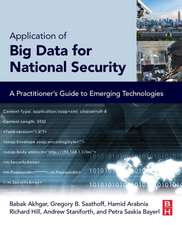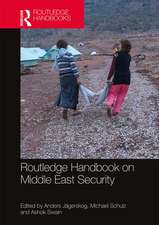Strategic Intelligence Management: National Security Imperatives and Information and Communications Technologies
Editat de Babak Akhgar, Simeon Yatesen Limba Engleză Hardback – 11 mar 2013
Academic researchers and graduate students in computer science, information studies, social science, law, terrorism studies, and politics, as well as professionals in the police, law enforcement, security agencies, and government policy organizations will welcome this authoritative and wide-ranging discussion of emerging threats.
- Hot topics like cyber terrorism, Big Data, and Somali pirates, addressed in terms the layperson can understand, with solid research grounding
- Fills a gap in existing literature on intelligence, technology, and national security
Preț: 362.79 lei
Preț vechi: 460.29 lei
-21% Nou
Puncte Express: 544
Preț estimativ în valută:
69.42€ • 72.48$ • 57.45£
69.42€ • 72.48$ • 57.45£
Carte tipărită la comandă
Livrare economică 28 martie-11 aprilie
Preluare comenzi: 021 569.72.76
Specificații
ISBN-13: 9780124071919
ISBN-10: 0124071910
Pagini: 340
Ilustrații: illustrations
Dimensiuni: 191 x 235 x 23 mm
Greutate: 0.91 kg
Editura: ELSEVIER SCIENCE
ISBN-10: 0124071910
Pagini: 340
Ilustrații: illustrations
Dimensiuni: 191 x 235 x 23 mm
Greutate: 0.91 kg
Editura: ELSEVIER SCIENCE
Public țintă
Students in homeland security and national security as well as information security programs in US and EMEA; law enforcement and intelligence practitioners in US, UK, & EuropeCuprins
Foreword (Lord Carlile of Berriew CBE, QC)
Part 1: National Security Strategies and Issues
1 Introduction: Strategy Formation in a Globalized and Networked Age—A Review of the Concept and its Definition
2 Securing the State: Strategic Responses for an Interdependent World
3 We Have Met the Enemy and They Are Us: Insider Threat and Its Challenge to National Security
4 An Age of Asymmetric Challenges—4th Generation Warfare at Sea
5 Port and Border Security: The First and Last Line of National Security Defense
Part 2: The Public, Communication, Risk, and National Security
6 Risk Communication, Risk Perception and Behavior as Foundations of Effective National Security Practices
7 Promoting Public Resilience against Chemical, Biological, Radiological and Nuclear Terrorism
8 From Local to Global: Community-based Policing and National Security
9 The Role of Social Media in Crisis: A European Holistic Approach to the Adoption of Online and Mobile Communications in Crisis Response and Search and Rescue Efforts
10 Emerging Technologies and the Human Rights Challenge of Rapidly Expanding State Surveillance Capacities
Part 3: Technologies, Information, and Knowledge for National Security
11 User Requirements and Training Needs within Security Applications: Methods for Capture and Communication
12 Exploring the Crisis Management/Knowledge Management Nexus
13 A Semantic Approach to Security Policy Reasoning
14 The ATHENA Project: Using Formal Concept Analysis to Facilitate the Actions of Responders in a Crisis Situation
15 Exploiting Intelligence for National Security
16 Re-thinking Standardization for Interagency Information Sharing
Part 4: Future Threats and Cyber Security
17 Securing Cyberspace: Strategic Responses for a Digital Age
18 National Cyber Defense Strategy
19 From Cyber Terrorism to State Actors’ Covert Cyber Operations
20 Cyber Security Countermeasures to Combat Cyber Terrorism
21 Developing a Model to Reduce and/or Prevent Cybercrime Victimization among the User Individuals
Concluding remarks
Part 1: National Security Strategies and Issues
1 Introduction: Strategy Formation in a Globalized and Networked Age—A Review of the Concept and its Definition
2 Securing the State: Strategic Responses for an Interdependent World
3 We Have Met the Enemy and They Are Us: Insider Threat and Its Challenge to National Security
4 An Age of Asymmetric Challenges—4th Generation Warfare at Sea
5 Port and Border Security: The First and Last Line of National Security Defense
Part 2: The Public, Communication, Risk, and National Security
6 Risk Communication, Risk Perception and Behavior as Foundations of Effective National Security Practices
7 Promoting Public Resilience against Chemical, Biological, Radiological and Nuclear Terrorism
8 From Local to Global: Community-based Policing and National Security
9 The Role of Social Media in Crisis: A European Holistic Approach to the Adoption of Online and Mobile Communications in Crisis Response and Search and Rescue Efforts
10 Emerging Technologies and the Human Rights Challenge of Rapidly Expanding State Surveillance Capacities
Part 3: Technologies, Information, and Knowledge for National Security
11 User Requirements and Training Needs within Security Applications: Methods for Capture and Communication
12 Exploring the Crisis Management/Knowledge Management Nexus
13 A Semantic Approach to Security Policy Reasoning
14 The ATHENA Project: Using Formal Concept Analysis to Facilitate the Actions of Responders in a Crisis Situation
15 Exploiting Intelligence for National Security
16 Re-thinking Standardization for Interagency Information Sharing
Part 4: Future Threats and Cyber Security
17 Securing Cyberspace: Strategic Responses for a Digital Age
18 National Cyber Defense Strategy
19 From Cyber Terrorism to State Actors’ Covert Cyber Operations
20 Cyber Security Countermeasures to Combat Cyber Terrorism
21 Developing a Model to Reduce and/or Prevent Cybercrime Victimization among the User Individuals
Concluding remarks
Recenzii
"...an important work and should be of interest to public officials, executives in the private sector, and others who have a serious appetite for a broader and deeper understanding of the security challenges we are all facing." --Security Management
"International contributors in computing, communications systems, criminology, and emergency medicine provide a detailed overview for scholars, policy makers, and those in law, security, government, and business. The book examines current issues of national security strategy in the context of new global communication networks and global connections among regions and resources." --Reference & Research Book News, December 2013
"International contributors in computing, communications systems, criminology, and emergency medicine provide a detailed overview for scholars, policy makers, and those in law, security, government, and business. The book examines current issues of national security strategy in the context of new global communication networks and global connections among regions and resources." --Reference & Research Book News, December 2013























